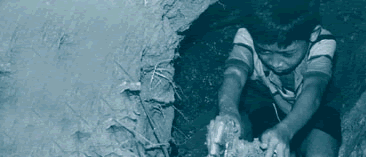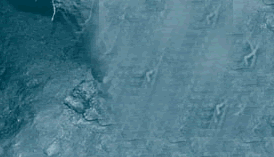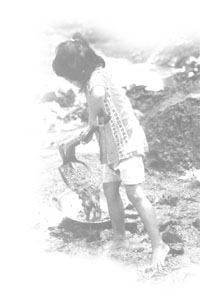 |
 |
||||||
 |
|||||||
| english | bahasa indonesia | home | TBP | action programmes | ||
|
|
ILO/IPEC's Project in the Fishing Industry - Medan Child labour in Indonesia is a phenomenon. It has been a culture, that children has been educated to help their parents since early age, therefore, it's often found many children involved in part time work and carried out other light types of work. This children involvement in such works is valued as something good because it teaches children responsibility that can give a use for them in the future. When Indonesia was facing economic crisis, the children was no longer doing light or part time works, they had to stop from going to school and many children were forced by their parents to make a living. Some of them have to work in the fishing sector (jermal and tangkul) because they have no other alternatives. Jermal is fishing rigs constructed on wood stilts in the sea floor. Jermal is typically found along the Eastern Coast of Four Northern Sumatra (Langkat, Deli Serdang, Asahan and Labuhan Batu). Besides jermal, there's also mini jermal called as Tangkul, which typically found in Langkat Regency. To reach the jermal or tangkul takes 1 to 3 hours by boat. Based on the survey, jermal and tangkul is one of the worst working environments for children because it harms their safety, health and development. Political Commitment Realizing that there are still many children working in dangerous working environment, particularly in the fishing sector in North Sumatra, the Governor himself directly leads in supporting the programme since the beginning. A Letter of Agreement was signed by the ILO and the North Sumatra Government and ratified by the local government in 15 April 2000. The form of the LoA implementation is the establishment of Komisi Penasehat Program (Programme Advisor Commission), Tim Implementasi Program (Programme Implementation Team) and the counterpart budget from the North Sumatra provincial government with an amount about USD 16,000 in year 2000 and USD 32,000 in year 2001. The Asahan local government has also been giving financial support with an amount about USD 1,000 to implement the chicken cultivation programme in year of 2001. Air Survey In May - July 2000, 2 base line surveys were conducted which objective is to get the total number of jermal and tangkul in Asahan, Labuhan Batu, Langkat and Deli Serdang area. The number collected based on the staff monitoring did not cover the whole area, therefore. Due to the main objective of the baseline surveys is to find out the children interest when they get back to the land, the surveys did not reach the actual number, the monitoring by the researcher staffs did not cover the whole area. In verifying the total number of jermal and tangkul, an air survey was conducted in 15 December 2000 with the aim is to note jermal and tangkul location in the Eastern Coast of Northern Sumatra. After the air survey, another monitoring conducted by the ILO/IPEC staffs to get the accuracy of the data and it was found that there were 128 jermals and 27 tangkuls. A field survey (the child labour place of origin), which focus is collecting data on children social economic and demographic situation, families and villages were also conducted, based on the survey of jermal and tangkul. Workshop and Joint Visit In July 2000, a workshop was conducted which participated by labour inspector. This workshop resulted a new strategy in developing work place approach system by joint visit. Continued Workshop was held in November 2000 at the North Sumatra provincial level, which resulted an integrated monitoring team that includes ILO/IPEC monitoring staff, government official and other related components. The first joint monitoring was carried out in 23 April 2001 and October 2001. This team had visited 121 journals and 21 tankers with 7 missions (3 days per mission), and also found 67 children are still working in jermal. Another workshop for the jermal foremen and owners because the
foremen are one of the keys in the elimination of child labour effort
in jermal/tangkul was also held. This type of workshop was conducted
for 14 times with 118 participants with the aim is to increase the
awareness about the impact of children working in jermal. The Navy
staffs, provincial labour inspectors and fishery department and
NGOs also attended this workshop. Based on the strategy, which resulted from the
integrated monitoring, the withdrawing of the children is designed
into 4 forms, which are: Until October 2001, 52 children had been re-integrated to their families voluntarily and 9 children were withdrawn by forced. In total, 144 children have been successfully withdrawn from jermal voluntarily by the ILO/IPEC monitoring team and the parents. Interactive Dialog "From Exploitation to Protection and Education" is the theme of the dialog. The aim of the this interactive dialog is to give opportunity for the children in formulating their protection and also raise the awareness about the worst forms of child labour amongst all parties, such as the executive, judicative, legislative, military, police, NGOs, workers, university students and media. This show was attended by 160 children who consist of child labour,
street children, blind children, and 120 adults from many institutions
and NGOs in North Sumatra. This show was also completed with music
show and songs from child labour and blind children and also painting
and photos exhibition about children who work in the Database ILO/IPEC Fishing sector has database, which regularly organized. The information from the database is used in the planning, programme policy decision making and also to inform the public about the quantitative information such as the number of children found and rescued, monitoring visits, programme development and the percentage of the achieved progress. The data base system will make the monitoring system more effective and efficient. The Institution Capacity Building A Design, Management and Evaluation (DME) training was held in November 2000, which participated, by 18 participants from NGOs and workers. This occasion was aimed to get participation and improve the future partners capacity. The main result of the DME training is the improvement of child labour elimination issue on the NGOs and workers level. Social Protection Programme and Partners The social protection programme is given to the ex-jermal child labour, their siblings or friends who are considered potential to work in the dangerous sector. This programme implemented in various activities, such as: temporary shelter, micro credit programme, fungus and vegetables cultivation, and chicken, duck, goat farm, etc. Besides that, there's also a skill programme which refers to the children talent based on the survey that had been conducted in 2000 such as mechanics and electronic skill and also furniture skill which conducted by Medan Occupational Learning Centre in the children hometown or MTU (mobile training unit). Radio Campaign This program is going as planned and results a media product, such as Insersi, jingle and talk show in June, July, Augustus, September and October 2001 and it's broadcasted in 10 local radios which covers almost all the targeted districts. The radio coverage estimated 5.000.000 listeners were reached. Mass Media Attention Since the programme started in 1999, it has taken the mass media attention, particularly in year 2001, whether it's local or international media. From the project database, they are 27 newspaper coverage, 9 radio interviews and 8 television interviews. In April 2001, the project was visited by 3 international television team: Sport Germany TV, CNN Australia and SVT Sweden. In July 2001, the BBC London made a direct coverage to Jermal. In December 2001, the project was also visited by a Germany mass media, Frankfurter Allgemeine Sonntagszeitung, which broadcasted in Germany version and English and the Times magazine also published in article about child labour on jermal in their February 4th, 2002 edition. Future Strategy The ILO/IPEC monitoring staffs find lesser jermal
and tangkul, which employ children these days. This situation shows
that the activities, which are carried out whether, it's on the
sea (by the monitoring team) or land (by partners) considered successful.
The workshop for the foremen, the social protection programme and
regular monitoring to jermals/tangkuls and the children hometown,
very supported the awareness raising on the danger of working on
jermals/tangkuls. Social agreement to stop child labour is important
to build while at the same time the law reinforcement for child
protection is being implemented. To reach the more understanding
about the complexity of child labour issues and national commitment
in addressing the child labour issues, particularly the fishing
sector, in the future the ILO/IPEC fishing project will: n
Extend the working sector, in which ILO/IPEC Fishing Sector project
will no longer only dealing with the child labour on jermals and
tangkuls, but also other sectors which in its nature can bring danger
to the working child labour. This activity will be integrated into
the fishing sector. Map of Indonesia Jermal Fishing
Platform (PDF format)
|
 |
||||
